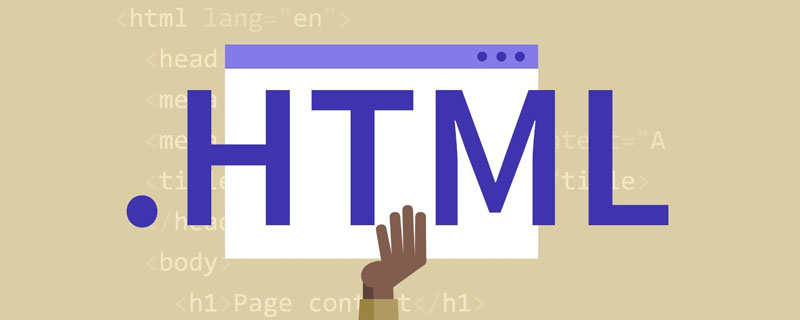The reasons why HTML5 should comply with W3c standards are to provide a consistent cross-platform experience, improve page accessibility and search engine optimization, ensure future compatibility and sustainability, reduce development and maintenance costs, and promote The development of Web technology, etc. Detailed introduction: 1. Provide a consistent cross-platform experience. Complying with W3C standards can ensure that web pages have consistent display and behavior on different browsers and devices; 2. Improve the accessibility of web pages. W3C standards emphasize the accessibility of web pages. Accessibility, i.e. making the page accessible to people with disabilities and assistive technology, etc.

The operating system for this tutorial: Windows 10 system, DELL G3 computer.
HTML5, as the latest HTML standard, defines the structure and content of Web pages and introduces many new functions and features. Complying with W3C standards is very important for the development and use of HTML5 for the following reasons:
1. Provide a consistent cross-platform experience: Complying with W3C standards ensures that web pages have consistent display and performance across different browsers and devices. Behavior. W3C standards provide developers with a set of common specifications and guidance, allowing developers to write more compatible code to ensure that it can be displayed and run correctly on different browsers and devices.
2. Improve page accessibility: W3C standards emphasize the accessibility of Web pages, that is, making pages more friendly to people with disabilities and assistive technologies (such as screen readers). Complying with W3C standards can ensure that the structure and content of the page are clear and clear, and use semantic tags and attributes so that the page can be correctly parsed and understood, improving the accessibility of the page.
3. Improve search engine optimization (SEO): Complying with W3C standards can improve the ranking and searchability of web pages in search engines. Search engines can more easily parse and index pages that meet standards, allowing them to better understand the content and structure of the page. In addition, pages that adhere to standards generally have better performance and user experience, which is also an important factor in search engine optimization.
4. Ensure future compatibility and sustainability: W3C standards have been extensively discussed and researched and represent the best practices and development direction of Web technology. Complying with W3C standards ensures that code will remain valid in future versions and can adapt to new technologies and needs. At the same time, the continuous updates and improvements of W3C standards also provide developers with more functions and features, allowing Web applications to keep up with technological developments and user needs.
5. Reduce development and maintenance costs: Complying with W3C standards allows developers to write more standardized and clear code, reducing errors and redundancy. Standardized code structure and semantic tags can improve code readability and maintainability, allowing developers to develop and maintain Web applications more quickly. In addition, standardized code also facilitates team collaboration and code reuse, reducing development and maintenance costs.
6. Promote the development of Web technology: As a standardization organization for Web technology, W3C promotes the development and innovation of Web technology by formulating and promoting standards. Complying with W3C standards allows developers to participate in the development of Web technology, work with other developers to promote the advancement of Web technology, and provide users with a better Web experience.
In summary, compliance with W3C standards is critical to the development and use of HTML5. It can provide a consistent cross-platform experience, improve page accessibility and search engine optimization, ensure future compatibility and sustainability, reduce development and maintenance costs, and promote the development of web technology. By complying with W3C standards, we can better utilize the functions and features of HTML5 to build high-quality, accessible, maintainable and scalable web applications.
The above is the detailed content of Why HTML5 should comply with W3c standards. For more information, please follow other related articles on the PHP Chinese website!
 html5的div一行可以放两个吗Apr 25, 2022 pm 05:32 PM
html5的div一行可以放两个吗Apr 25, 2022 pm 05:32 PMhtml5的div元素默认一行不可以放两个。div是一个块级元素,一个元素会独占一行,两个div默认无法在同一行显示;但可以通过给div元素添加“display:inline;”样式,将其转为行内元素,就可以实现多个div在同一行显示了。
 html5中列表和表格的区别是什么Apr 28, 2022 pm 01:58 PM
html5中列表和表格的区别是什么Apr 28, 2022 pm 01:58 PMhtml5中列表和表格的区别:1、表格主要是用于显示数据的,而列表主要是用于给数据进行布局;2、表格是使用table标签配合tr、td、th等标签进行定义的,列表是利用li标签配合ol、ul等标签进行定义的。
 html5怎么让头和尾固定不动Apr 25, 2022 pm 02:30 PM
html5怎么让头和尾固定不动Apr 25, 2022 pm 02:30 PM固定方法:1、使用header标签定义文档头部内容,并添加“position:fixed;top:0;”样式让其固定不动;2、使用footer标签定义尾部内容,并添加“position: fixed;bottom: 0;”样式让其固定不动。
 HTML5中画布标签是什么May 18, 2022 pm 04:55 PM
HTML5中画布标签是什么May 18, 2022 pm 04:55 PMHTML5中画布标签是“<canvas>”。canvas标签用于图形的绘制,它只是一个矩形的图形容器,绘制图形必须通过脚本(通常是JavaScript)来完成;开发者可利用多种js方法来在canvas中绘制路径、盒、圆、字符以及添加图像等。
 html5中不支持的标签有哪些Mar 17, 2022 pm 05:43 PM
html5中不支持的标签有哪些Mar 17, 2022 pm 05:43 PMhtml5中不支持的标签有:1、acronym,用于定义首字母缩写,可用abbr替代;2、basefont,可利用css样式替代;3、applet,可用object替代;4、dir,定义目录列表,可用ul替代;5、big,定义大号文本等等。
 html5废弃了哪个列表标签Jun 01, 2022 pm 06:32 PM
html5废弃了哪个列表标签Jun 01, 2022 pm 06:32 PMhtml5废弃了dir列表标签。dir标签被用来定义目录列表,一般和li标签配合使用,在dir标签对中通过li标签来设置列表项,语法“<dir><li>列表项值</li>...</dir>”。HTML5已经不支持dir,可使用ul标签取代。
 html5是什么意思Apr 26, 2021 pm 03:02 PM
html5是什么意思Apr 26, 2021 pm 03:02 PMhtml5是指超文本标记语言(HTML)的第五次重大修改,即第5代HTML。HTML5是Web中核心语言HTML的规范,用户使用任何手段进行网页浏览时看到的内容原本都是HTML格式的,在浏览器中通过一些技术处理将其转换成为了可识别的信息。HTML5由不同的技术构成,其在互联网中得到了非常广泛的应用,提供更多增强网络应用的标准机。
 html5为什么只需要写doctypeJun 07, 2022 pm 05:15 PM
html5为什么只需要写doctypeJun 07, 2022 pm 05:15 PM因为html5不基于SGML(标准通用置标语言),不需要对DTD进行引用,但是需要doctype来规范浏览器的行为,也即按照正常的方式来运行,因此html5只需要写doctype即可。“!DOCTYPE”是一种标准通用标记语言的文档类型声明,用于告诉浏览器编写页面所用的标记的版本。


Hot AI Tools

Undresser.AI Undress
AI-powered app for creating realistic nude photos

AI Clothes Remover
Online AI tool for removing clothes from photos.

Undress AI Tool
Undress images for free

Clothoff.io
AI clothes remover

AI Hentai Generator
Generate AI Hentai for free.

Hot Article

Hot Tools

Safe Exam Browser
Safe Exam Browser is a secure browser environment for taking online exams securely. This software turns any computer into a secure workstation. It controls access to any utility and prevents students from using unauthorized resources.

ZendStudio 13.5.1 Mac
Powerful PHP integrated development environment

SublimeText3 English version
Recommended: Win version, supports code prompts!

Zend Studio 13.0.1
Powerful PHP integrated development environment

Dreamweaver CS6
Visual web development tools






